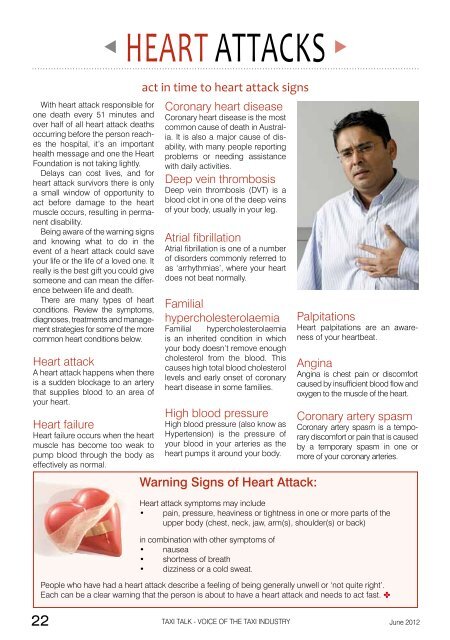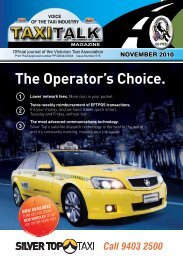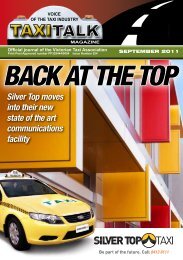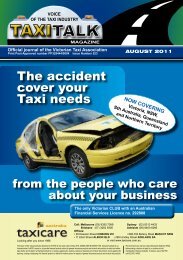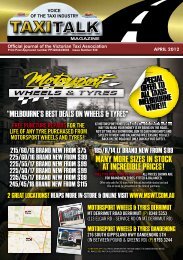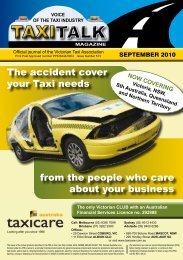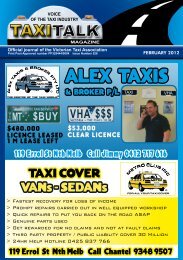You also want an ePaper? Increase the reach of your titles
YUMPU automatically turns print PDFs into web optimized ePapers that Google loves.
t<br />
HEART ATTACKS u<br />
With heart attack responsible for<br />
one death every 51 minutes and<br />
over half of all heart attack deaths<br />
occurring before the person reaches<br />
the hospital, it’s an important<br />
health message and one the Heart<br />
Foundation is not taking lightly.<br />
Delays can cost lives, and for<br />
heart attack survivors there is only<br />
a small window of opportunity to<br />
act before damage to the heart<br />
muscle occurs, resulting in permanent<br />
disability.<br />
Being aware of the warning signs<br />
and knowing what to do in the<br />
event of a heart attack could save<br />
your life or the life of a loved one. It<br />
really is the best gift you could give<br />
someone and can mean the difference<br />
between life and death.<br />
There are many types of heart<br />
conditions. Review the symptoms,<br />
diagnoses, treatments and management<br />
strategies for some of the more<br />
common heart conditions below.<br />
Heart attack<br />
A heart attack happens when there<br />
is a sudden blockage to an artery<br />
that supplies blood to an area of<br />
your heart.<br />
Heart failure<br />
Heart failure occurs when the heart<br />
muscle has become too weak to<br />
pump blood through the body as<br />
effectively as normal.<br />
act in time to heart attack signs<br />
Coronary heart disease<br />
Coronary heart disease is the most<br />
common cause of death in Australia.<br />
It is also a major cause of disability,<br />
with many people reporting<br />
problems or needing assistance<br />
with daily activities.<br />
Deep vein thrombosis<br />
Deep vein thrombosis (DVT) is a<br />
blood clot in one of the deep veins<br />
of your body, usually in your leg.<br />
Atrial fibrillation<br />
Atrial fibrillation is one of a number<br />
of disorders commonly referred to<br />
as ‘arrhythmias’, where your heart<br />
does not beat normally.<br />
Familial<br />
hypercholesterolaemia<br />
Familial hypercholesterolaemia<br />
is an inherited condition in which<br />
your body doesn’t remove enough<br />
cholesterol from the blood. This<br />
causes high total blood cholesterol<br />
levels and early onset of coronary<br />
heart disease in some families.<br />
High blood pressure<br />
High blood pressure (also know as<br />
Hypertension) is the pressure of<br />
your blood in your arteries as the<br />
heart pumps it around your body.<br />
Warning Signs of Heart Attack:<br />
Palpitations<br />
Heart palpitations are an awareness<br />
of your heartbeat.<br />
Angina<br />
Angina is chest pain or discomfort<br />
caused by insufficient blood flow and<br />
oxygen to the muscle of the heart.<br />
Coronary artery spasm<br />
Coronary artery spasm is a temporary<br />
discomfort or pain that is caused<br />
by a temporary spasm in one or<br />
more of your coronary arteries.<br />
Heart attack symptoms may include<br />
• pain, pressure, heaviness or tightness in one or more parts of the<br />
upper body (chest, neck, jaw, arm(s), shoulder(s) or back)<br />
in combination with other symptoms of<br />
• nausea<br />
• shortness of breath<br />
• dizziness or a cold sweat.<br />
People who have had a heart attack describe a feeling of being generally unwell or ‘not quite right’.<br />
Each can be a clear warning that the person is about to have a heart attack and needs to act fast. D<br />
22<br />
<strong>Taxi</strong> <strong>Talk</strong> - voice of the taxi industry <strong>June</strong> <strong>2012</strong>


